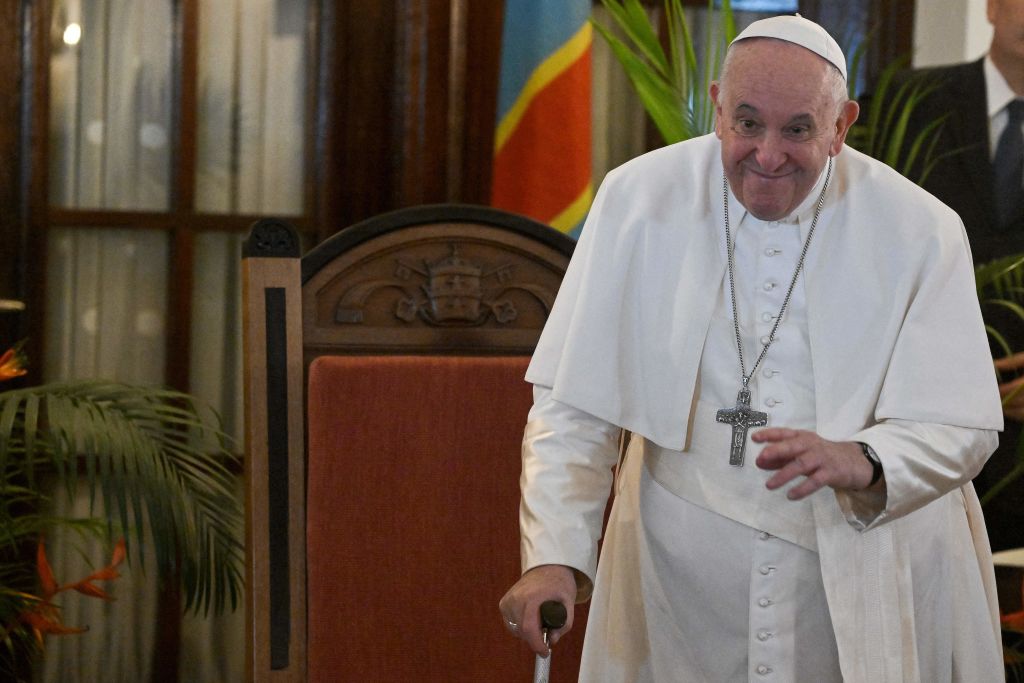
There was much optimism on the streets of Juda when South Sudan became the world’s newest country in 2011. But the euphoria was short-lived, as the African country descended into civil war and famine. Now, Pope Francis is trying to raise global attention for South Sudan as he begins a three-day trip Friday to the country as part of a “pilgrimage of peace.”
The Pope’s trip, alongside the Archbishop of Canterbury, Justin Welby, and the Moderator of the General Assembly of the Church of Scotland, Iain Greenshield, is centered around raising awareness about a conflict that has left over 400,000 people dead.
The majority Christian South Sudan broke away from majority Muslim Sudan in 2011, but slipped into civil war two years later. The South Sudanese conflict began with an internal political dispute between President Salva Kiir and then-Vice President Riek Machar, which ballooned into a wider ethnic battle between the former’s Dinka community and the latter’s Nuer ethnic group.
The trip is not the first time Pope Francis has sought to urge peace. In 2019, during a meeting in the Vatican, Francis knelt and kissed the feet of Kiir and Machar. The Pope had been planning to visit South Sudan for years but was delayed by security concerns.
Below, what to know about the Pope’s trip to South Sudan, and his three-day trip to the Democratic Republic of Congo that preceded it.
Why is the Pope in South Sudan?
After a successful visit to the DRC, the pope arrived in Juda, South Sudan, to celebratory crowds. The nation, barely 12 years old, has never welcomed a Western leader on a public visit.
The “three wise men”—as some call Francis, Welby, and Greenshield—were greeted by tens of thousands of people singing and ululating to celebrate the occasion.
Approximately 6 million of South Sudan’s 11 million people are Catholic. In the colonial era, Christian missionaries in Sudan were divided by the Nile river, with Catholics and Anglicans made to preach on opposing sides, according to the New York Times.
Francis was reunited with Kiir, a former rebel who has led the nation since its 2011 independence, and his deputy-turned-rival Machar.
But deadly clashes between cattle herders and militia a day before Pope Francis’ arrival were a reminder of the ongoing conflict. 27 people reportedly died, including five children. Writing on Twitter, Welby called the killings “a story too often heard across South Sudan.”
The country also faces a number of other issues. There are currently over 2.2 million internally displaced people in South Sudan and 2.3 million people have fled the country, according to U.N. statistics. Last year, the country was also found to be the most corrupt in the world by Transparency International.
The country faces a number of investigative reports that show how oil revenue worth billions of dollars have disappeared and officials cannot account for the wealth, according to the New York Times.
While the Pope’s visit wont correct these rife issues, it has promoted global conversations by bringing these two nations back in the spotlight.
Why did the Pope visit the Democratic Republic of the Congo?
The Democratic Republic of Congo, like South Sudan, has also been grappling with conflict. More than 120 rebel groups have been locked in a conflict with the government for three decades.
The Catholic Church has been a counterweight to the state in DRC. In 2019, clerics who monitored the election that year said the result that saw current President Felix Tshisekedi take office was manipulated.
The country declared a public holiday in anticipation of the rare papal visit—a first in almost four decades. Huge crowds gathered in the capital, Kinshasa, to watch Pope Francis deliver an open-air mass. Around half of the nation’s citizens observe Catholicism, making it Africa’s largest Catholic community.
During his speech, Francis condemned the history of European colonialism and exploitation of Africa’s resources. Minerals play a key role in the ongoing fighting today.
The Vatican’s envoy to the DRC said the Pope’s trip aimed to remind the world not to ignore decades-long conflicts. He was met with applause when he said: “Hands off the Democratic Republic of the Congo! Hands off Africa! Stop choking Africa, it is not a mine to be stripped or a terrain to be plundered.”
The nation has also been rife with over 100 armed groups fighting for territorial control or using it as a base to attack neighboring countries such as Angola, Rwanda, and Uganda, Al Jazeera reported.
More Must-Reads from TIME
- Cybersecurity Experts Are Sounding the Alarm on DOGE
- Meet the 2025 Women of the Year
- The Harsh Truth About Disability Inclusion
- Why Do More Young Adults Have Cancer?
- Colman Domingo Leads With Radical Love
- How to Get Better at Doing Things Alone
- Michelle Zauner Stares Down the Darkness
Write to Armani Syed at armani.syed@time.com